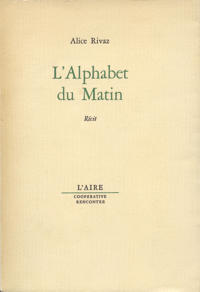A young girl stepping into life, tensions rising within a family. Discovering the world, reading, music, people… Just as the alphabet consists of 26 letters, this book comprises 26 chapters collated in four parts illustrating how her discovery and awareness gradually extend, in the same way concentric ripples widen when we throw a stone into water.
The first part introduces the girl’s mother and father, then her house and neighbours. The second part reveals the small town of Clarens, the surrounding countryside, Lake Geneva and nearby mountains, then the extended family, especially her grandmother and Aunt Louise. The scope widens in the third part, with renditions of the social and political environment, as well as of local events such as the May Day procession, and the news of the assassination of Jean Jaurès, both of which brought tears to her father’s eyes, leaving a lasting impression on the young girl. Finally, the fourth part introduces us to a slice of cultural and intellectual life in the early 20th century, as well as striking summaries of the history of the people of Israel and of the people of Switzerland. The world becomes complex, and the child loses her fledgling naivety...
Above all, L’Alphabet du matin (The morning alphabet) is the story of learning to read, discovering music, the dawn of the child’s social life through school, and of the confrontation with what she calls “the-very-sad-things-in-life”, misfortunes that trigger “her first great human despair”. We discover an extremely sensitive child with acute insight, apparent obedience, and a vivid imagination, all of which herald the future novelist.
Learning to read and discovering music are a revelation of irrefutable happiness, a milestone marking her destiny to become a pianist and writer! To the young girl’s amazement, the notes on the musical stave turn into “swallows” perched on “long telephone wires”!
As with Comptez vos jours (Count your days) and Jette ton pain (Cast thy bread), L’Alphabet du matin seems akin to an autobiography. Nonetheless, the novelist did not wish to simply tell her life story in what she called “a narrative”: All three protagonists are given pseudonyms. Her intention to dissociate the narrative from her own journey tends to give it a more general meaning. Some may have read L’Alphabet du matin as a mere coming-of-age novel, an account of a happy childhood. Reading it as such would however limit the scope of the text. L’Alphabet du matin is also the story of the birth and rise of socialism, of the social and political upheavals that started to shake up the canton of Vaud in the early 20th century.

